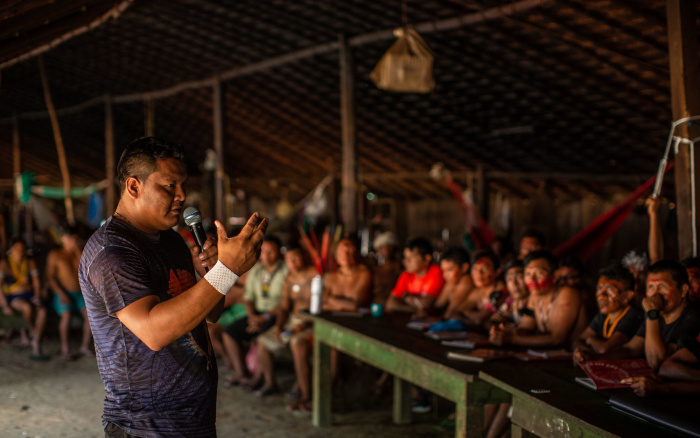Você está na versão anterior do website do ISA
Atenção
Essa é a versão antiga do site do ISA que ficou no ar até março de 2022. As informações institucionais aqui contidas podem estar desatualizadas. Acesse https://www.socioambiental.org para a versão atual.
Maurício Ye’kwana makes urgent appeal to the UN for removal of illegal miners from Yanomami Territory
sexta-feira, 25 de Setembro de 2020 
Esta notícia está associada ao Programa:
Spokesperson for the #MinersOutCovidOut campaign denounces the Bolsonaro government’s neglect of indigenous peoples in the Amazon during the pandemic
Maurício Ye’kwana, director of Hutukara Yanomami Association and a spokesperson for the #MinersOutCovidOut Campaign, spoke this Friday (09/25/2020) at the 45th Session of the UN Human Rights Council (HRC). In his speech, previously recorded in Spanish, Maurício denounced the invasion of the Yanomami Territory by illegal miners, a main vector for infection by Covid-19 and other diseases such as malaria, and warned of the increasing devastation and contamination of the environment.
Maurício also addressed the Bolsonaro government's neglect of indigenous peoples in the Amazon, severely affected by the new coronavirus and by pre-existing threats, such as deforestation and fires.
"Our territory has been invaded by over 20,000 illegal miners in search of gold, who bring diseases like malaria, as well as alcohol, drugs and violence to our communities, and pollute our rivers with mercury," said the Ye'kwana leader on the video, which was heard by diplomatic representatives from several countries, all participating in this mixed session of the HRC.
Due to the pandemic, the session of the HRC, whose official agenda runs from September 14 to October 6, is taking place for the first time in a mixed format, with online participation. The UN body is made up of 47 member states elected by the UN General Assembly; civil society is invited to speak out on human rights issues during the sessions.
Read more:
Covid-19 could infect up to 40% of the Yanomami communities surrounded by illegal mining
“So what – there’s only one thing that can save us: miners out now!”
"The footprints of the heart eater, the lung eater have now appeared"
During his speech, Maurício also highlighted that indigenous leaders have been demanding that the Brazilian government urgently removes the illegal miners from their territory. The opposite is happening, however: “in public speeches, government officials encourage the illegal exploitation of gold on indigenous lands in the Amazon, and that intensifies threats against us. We continue to see the forest being destroyed. That is why I came, once again, to denounce the negligence of the Brazilian Government.”
The Hutukara Yanomami Association was invited to participate in the session of the UN Human Rights Council by Conectas Human Rights, a Brazilian NGO.
It is not the first time that a leader from the Yanomami Territory has spoken at a session of the UN Human Rights Council. The Yanomami shaman and leader Davi Kopenawa spoke at a session in Geneva in March 2020, denouncing the risk of genocide faced by indigenous peoples in voluntary isolation in Brazil. He presented a study by the Instituto Socioambiental (ISA) that showed an explosion of deforestation rates in the Amazon in territories where these populations are present.
Statement of Maurício Ye’kwana to the UN Human Rights Council (translation of video transcript)
Madam President:
My name is Mauricio Ye’kwana, I am a director of the Hutukara Yanomami Association, and I am here representing the Yanomami and Ye’kwana Leadership Forum.
Our territory has been invaded by more than 20,000 illegal gold miners who bring diseases such as malaria, as well as alcohol, drugs and violence to our communities, and they also pollute our rivers with mercury.
In 2020, two Yanomami were killed by gold miners. And in the midst of the pandemic, the miners have also brought Covid-19, infecting the communities that live near mining areas.
As leaders, we have been demanding that the Brazilian Government comply with its duty to remove the illegal miners, but the government has not given us an adequate response to this problem.
On the contrary, in public speeches, government officials encourage the illegal exploitation of gold in indigenous lands in the Amazon, and that intensifies threats against us.
We continue to see the forest being destroyed. That is why I have come, once again, to denounce the negligence of the Brazilian Government.” We ask for support from the international community so that our rights are respected.
Thank you for listening to my words.
Translation: Christine Halvorson
Evilene Paixão
ISA
Imagens:


